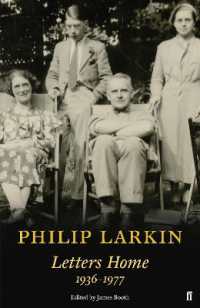- ホーム
- > 洋書
- > 英文書
- > History / World
Full Description
In Families in War and Peace Sarah C. Chambers places gender analysis and family politics at the center of Chile's struggle for independence and its subsequent state building. Linking the experiences of both prominent and more humble families to Chile's political and legal history, Chambers argues that matters such as marriage, custody, bloodlines, and inheritance were crucial to Chile's transition from colony to nation. She shows how men and women extended their familial roles to mobilize kin networks for political ends, both during and after the Chilean revolution. From the conflict's end in 1823 until the 1850s, the state adopted the rhetoric of paternal responsibility along with patriarchal authority, which became central to the state building process. Chilean authorities, Chambers argues, garnered legitimacy by enacting or enforcing paternalist laws on property restitution, military pensions, and family maintenance allowances, all of which provided for diverse groups of Chileans. By acting as the fathers of the nation, they aimed to reconcile the "greater Chilean family" and form a stable government and society.
Contents
Acknowledgments ix
Introduction 1
Part I. Families at War
1. Kin Mobilized for War: The Carrera Family Drama, 1810-1824 25
2. Reconquest and War to the Death: Patriot and Royalist Families Face Sanctions and Separation 62
3. ÉmigrÉs, Refugees, and Property Seizures: Chilean Officials in the Role of Family Providers 91
Part II. Reconciling the National Family
4. Constituting the Greater Chilean Family: Nation-State Formation and the Restitution of Property 125
5. Protecting Soldiers' Patrimony: Expanding Pension Eligibility for Widows and Orphans 155
6. Enforcing Paternal Responsibilities: Legal Disputes over Family Maintenance and Custody 182
Conclusion 213
Appendix: Chronology of Events in Chile 225
Notes 229
Bibliography 267
Index 277








